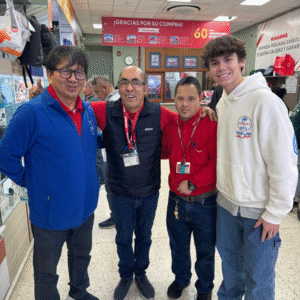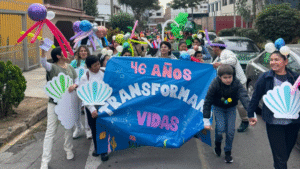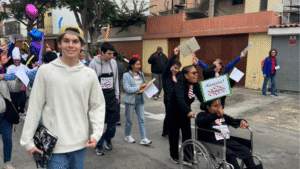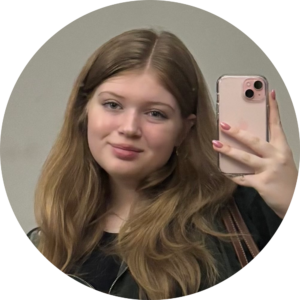17-year-old Noah shares his experience with CASP, an organisation that helps people with developmental disabilities to gain independence

Noah (far right) and a CASP instructor (far left) with two students at their job at a department store in Lima.
Picture courtesy of: Noah Saphier
Article link copied.
October 31, 2025
Parading in the streets of Lima: My experience with Centro Ann Sullivan Del Perú

This August, I spent two weeks in Peru, and I didn’t see Machu Picchu. Rather, I stayed in the capital, Lima, for a specific purpose: I was going to volunteer at Centro Ann Sullivan Del Perú (CASP).
CASP is an organisation that focuses on helping individuals (from young children to adults) with developmental disabilities such as autism and Down syndrome. University of Kentucky graduate Liliana Mayo, PhD, founded the non-profit in her parents’ garage in 1979, and it has now grown to more than 60 specialists with an incredible headquarters in Lima.
Harbingers’ Weekly Brief
The CASP philosophy has ten basic principles that govern how the centre operates, including “We must focus on abilities and not on disabilities.”
Through virtual and in-person lessons with families, the centre teaches using two major principles: el poder de dos (the power of two) and “30%, 70%”. The first principle signifies that the family and the centre have to work together to help the students. The second shows that this relationship must be 30% the work of the student and 70% the work of the family.
Since the students don’t live in the centre and some live hours away, most spend at least 70% of their time at home. This means that the families must learn how to work with their children so that they can improve over time.
On my first day at CASP, I was a little nervous. I’ve worked with people with developmental disabilities, and have communicated with them only through Spanish, but CASP seemed like such a structured organisation that I became overwhelmed. I didn’t know where I could help out or what they expected me to do.
This feeling quickly changed, as within my very first hour, I was invited to a boy’s birthday party that was being held at CASP.
I instantly felt welcomed, as everyone was showing me how to dance, an art that I had rarely practiced before.
After eating brownies and creampuffs on the dance floor, I was given a party gift: a bag full of Peruvian chocolates and wafers. From this moment, I felt at home.
In the following days, I visited the TGI Fridays restaurant where some students of CASP have jobs cleaning the tables before the restaurant opens, and I was able to see the culmination of hours upon hours of hard work. CASP uses its kitchen and laundry facilities to set up real-world scenarios where students can learn how to cook and clean, and develop other important life skills. Giving the students this training allows them to be more self-sufficient and, hopefully one day, use their skills to get a job.
On the birthday of one of the instructors at CASP, I went to the kitchen with about ten students to make tortilla de raya, a potato, egg and ham omelette. I worked one-on-one with a student as she cracked the eggs, sprinkled the ham, put in the salt and pepper, and crushed the potatoes. The instructors at CASP had taught me to let the students do the work and figure out how to do things themselves, while only assisting when necessary, as this would maximise their training in becoming more independent.
I’ve already mentioned two parties, so you probably get a sense of the immense joy at CASP. However, nothing compares to the 46th anniversary passacalle (parade). For my entire two weeks at CASP, I had heard every day about the upcoming passacalle that was going to happen, but I was quite confused. While I even helped prepare for it by making costumes, I could never have imagined the scale of it.
Hundreds of students and their loved ones flooded the streets, holding banners and balloons while wearing elaborate costumes. We walked alongside several marching bands, and everyone was cheering and smiling. People came to the front of their homes and stood on their porches to video and cheer. It all felt like a wonderful dream where everyone was perfectly happy.


CASP students flood the streets to celebrate the institution’s 46th anniversary.
Picture courtesy of: Noah Saphier
Noah walking with the parade celebrating CASP’s 46th anniversary.
Picture courtesy of: Noah Saphier
My experience at CASP working with people with developmental disabilities and alongside amazing instructors taught me many lessons beyond just improving my Spanish. CASP’s mission, clear through their students and instructors, showed me the importance of having dedication towards a specific goal. Whether it be helping those around you, giving them a hug or a smile, or just cheering others as they parade around the city, you can always make a difference.
Written by:

Editor-in-Chief 2025
New Jersey, United States of America
Born in 2007 in New Jersey, Noah Aaron Brühl Saphier studies in Englewood New Jersey, United States of America. He is interested in journalism, economics, science, sports, and history.
Noah joined Harbingers’ Magazine in the summer of 2023. A few months later, he became a writer covering economics, business, and politics. After almost two years of dedication and hard work, he was promoted to Editor-in-chief of the magazine. In March 2025, he took the helm from Jefferson He, who stepped down after completing his one-year term.
In his free time, Noah plays tennis and the violin, learns about exploration in the ocean and space, and travels.
Noah speaks English, Spanish, and German.
Edited by:

🌍 Join the World's Youngest Newsroom—Create a Free Account
Sign up to save your favourite articles, get personalised recommendations, and stay informed about stories that Gen Z worldwide actually care about. Plus, subscribe to our newsletter for the latest stories delivered straight to your inbox. 📲
© 2025 The Oxford School for the Future of Journalism


